Kailin Jiang
KORE: Enhancing Knowledge Injection for Large Multimodal Models via Knowledge-Oriented Augmentations and Constraints
Oct 22, 2025Abstract:Large Multimodal Models encode extensive factual knowledge in their pre-trained weights. However, its knowledge remains static and limited, unable to keep pace with real-world developments, which hinders continuous knowledge acquisition. Effective knowledge injection thus becomes critical, involving two goals: knowledge adaptation (injecting new knowledge) and knowledge retention (preserving old knowledge). Existing methods often struggle to learn new knowledge and suffer from catastrophic forgetting. To address this, we propose KORE, a synergistic method of KnOwledge-oRientEd augmentations and constraints for injecting new knowledge into large multimodal models while preserving old knowledge. Unlike general text or image data augmentation, KORE automatically converts individual knowledge items into structured and comprehensive knowledge to ensure that the model accurately learns new knowledge, enabling accurate adaptation. Meanwhile, KORE stores previous knowledge in the covariance matrix of LMM's linear layer activations and initializes the adapter by projecting the original weights into the matrix's null space, defining a fine-tuning direction that minimizes interference with previous knowledge, enabling powerful retention. Extensive experiments on various LMMs, including LLaVA-v1.5-7B, LLaVA-v1.5-13B, and Qwen2.5-VL-7B, show that KORE achieves superior new knowledge injection performance and effectively mitigates catastrophic forgetting.
When Large Multimodal Models Confront Evolving Knowledge:Challenges and Pathways
May 30, 2025Abstract:Large language/multimodal models (LLMs/LMMs) store extensive pre-trained knowledge but struggle to maintain consistency with real-world updates, making it difficult to avoid catastrophic forgetting while acquiring evolving knowledge. Previous work focused on constructing textual knowledge datasets and exploring knowledge injection in LLMs, lacking exploration of multimodal evolving knowledge injection in LMMs. To address this, we propose the EVOKE benchmark to evaluate LMMs' ability to inject multimodal evolving knowledge in real-world scenarios. Meanwhile, a comprehensive evaluation of multimodal evolving knowledge injection revealed two challenges: (1) Existing knowledge injection methods perform terribly on evolving knowledge. (2) Supervised fine-tuning causes catastrophic forgetting, particularly instruction following ability is severely compromised. Additionally, we provide pathways and find that: (1) Text knowledge augmentation during the training phase improves performance, while image augmentation cannot achieve it. (2) Continual learning methods, especially Replay and MoELoRA, effectively mitigate forgetting. Our findings indicate that current knowledge injection methods have many limitations on evolving knowledge, which motivates further research on more efficient and stable knowledge injection methods.
Benchmarking Multimodal Knowledge Conflict for Large Multimodal Models
May 26, 2025Abstract:Large Multimodal Models(LMMs) face notable challenges when encountering multimodal knowledge conflicts, particularly under retrieval-augmented generation(RAG) frameworks where the contextual information from external sources may contradict the model's internal parametric knowledge, leading to unreliable outputs. However, existing benchmarks fail to reflect such realistic conflict scenarios. Most focus solely on intra-memory conflicts, while context-memory and inter-context conflicts remain largely investigated. Furthermore, commonly used factual knowledge-based evaluations are often overlooked, and existing datasets lack a thorough investigation into conflict detection capabilities. To bridge this gap, we propose MMKC-Bench, a benchmark designed to evaluate factual knowledge conflicts in both context-memory and inter-context scenarios. MMKC-Bench encompasses three types of multimodal knowledge conflicts and includes 1,573 knowledge instances and 3,381 images across 23 broad types, collected through automated pipelines with human verification. We evaluate three representative series of LMMs on both model behavior analysis and conflict detection tasks. Our findings show that while current LMMs are capable of recognizing knowledge conflicts, they tend to favor internal parametric knowledge over external evidence. We hope MMKC-Bench will foster further research in multimodal knowledge conflict and enhance the development of multimodal RAG systems. The source code is available at https://github.com/MLLMKCBENCH/MLLMKC.
MMKE-Bench: A Multimodal Editing Benchmark for Diverse Visual Knowledge
Feb 27, 2025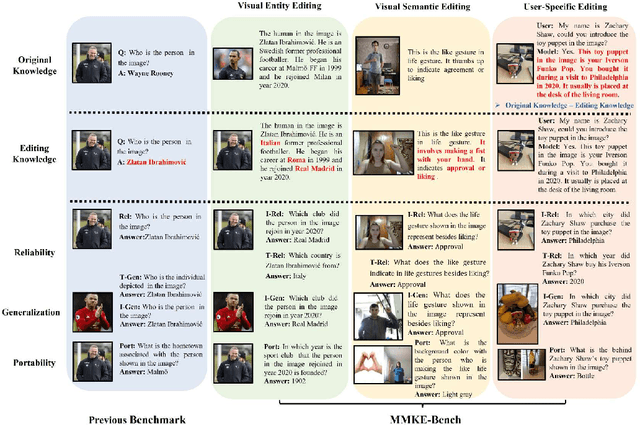

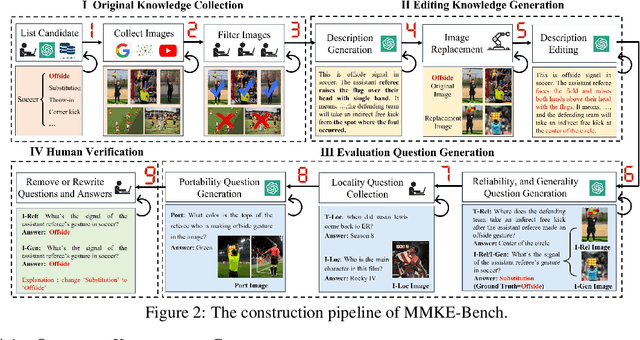
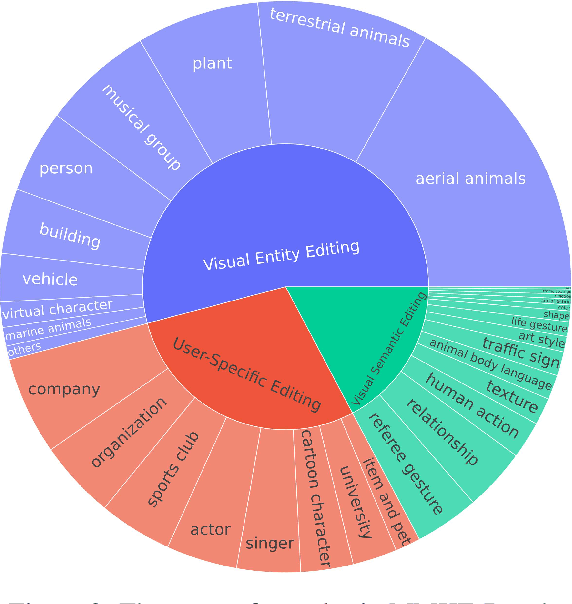
Abstract:Knowledge editing techniques have emerged as essential tools for updating the factual knowledge of large language models (LLMs) and multimodal models (LMMs), allowing them to correct outdated or inaccurate information without retraining from scratch. However, existing benchmarks for multimodal knowledge editing primarily focus on entity-level knowledge represented as simple triplets, which fail to capture the complexity of real-world multimodal information. To address this issue, we introduce MMKE-Bench, a comprehensive MultiModal Knowledge Editing Benchmark, designed to evaluate the ability of LMMs to edit diverse visual knowledge in real-world scenarios. MMKE-Bench addresses these limitations by incorporating three types of editing tasks: visual entity editing, visual semantic editing, and user-specific editing. Besides, MMKE-Bench uses free-form natural language to represent and edit knowledge, offering a more flexible and effective format. The benchmark consists of 2,940 pieces of knowledge and 8,363 images across 33 broad categories, with evaluation questions automatically generated and human-verified. We assess five state-of-the-art knowledge editing methods on three prominent LMMs, revealing that no method excels across all criteria, and that visual and user-specific edits are particularly challenging. MMKE-Bench sets a new standard for evaluating the robustness of multimodal knowledge editing techniques, driving progress in this rapidly evolving field.
In-Context Editing: Learning Knowledge from Self-Induced Distributions
Jun 17, 2024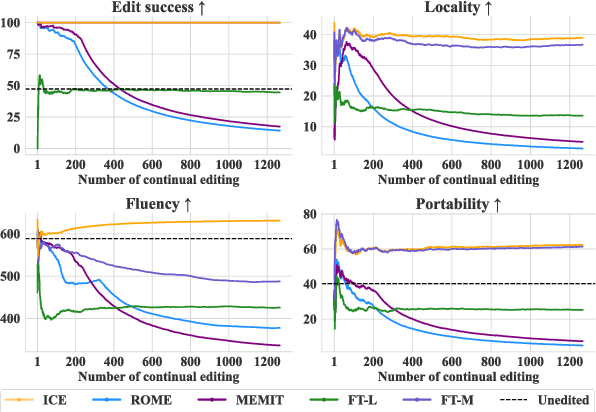

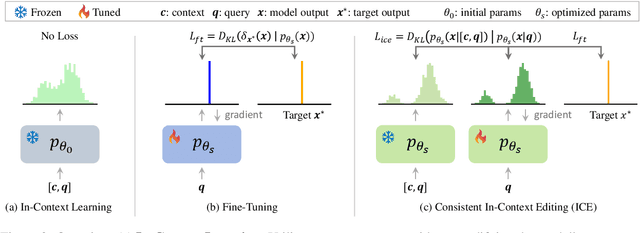

Abstract:The existing fine-tuning paradigm for language models is brittle in knowledge editing scenarios, where the model must incorporate new information without extensive retraining. This brittleness often results in overfitting, reduced performance, and unnatural language generation. To address this, we propose Consistent In-Context Editing (ICE), a novel approach that leverages the model's in-context learning capability to tune toward a contextual distribution rather than a one-hot target. ICE introduces a straightforward optimization framework that includes both a target and a procedure, enhancing the robustness and effectiveness of gradient-based tuning methods. We provide analytical insights into ICE across four critical aspects of knowledge editing: accuracy, locality, generalization, and linguistic quality, showing its advantages. Experimental results across four datasets confirm the effectiveness of ICE and demonstrate its potential for continual editing, ensuring that updated information is incorporated while preserving the integrity of the model.
 Add to Chrome
Add to Chrome Add to Firefox
Add to Firefox Add to Edge
Add to Edge